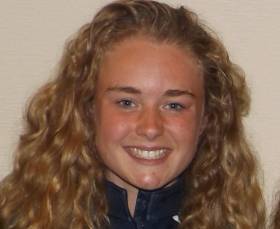Displaying items by tag: Hannah Scott
Big Win For Bann's Hannah Scott
#Rowing: Bann rower Hannah Scott won at the British National Schools’ Regatta at Dorney Lake today. The Coleraine girl won the Championship Girls Single Sculls (The Internationals’ Cup). She is bound for Princeton once she completes her studies in Northern Ireland.
Hannah Scott is Afloat Rower of the Month for February
#Rowing: Hannah Scott is the Afloat Rower of the Month for February. The Bann girl topped the rankings at the Ireland Assessment. Her time of 25 minutes and 32 seconds for the six kilometre course at Lough Rynn in Leitrim gave her a remarkable mark of 89.10 per cent of projected world best time for a junior woman over this distance.
Scott was part of the Ireland junior quadruple which won a bronze medal at the Coupe de la Jeunesse in 2016. In that crew, she was partnered by Lucy Taylor, Fiona Chestnutt and Margaret Cremen.
Rower of the Month awards: The judging panel is made up of Liam Gorman, rowing correspondent of The Irish Times, and David O'Brien, editor of Afloat magazine. Monthly awards for achievements during the year will appear on afloat.ie. Keep a monthly eye on progress and watch our 2017 champions list grow.
Silver and Bronze for Ireland Rowers at Coupe de la Jeunesse
#Rowing: Ireland took two medals on the second day of the Coupe de la Jeunesse in Poznan, Poland today. The Ireland pair of Tara Hanlon and Amy Mason rowed to a fine second place behind Britain, putting pressure on the long-time leaders coming up to the line. The junior quadruple of Lucy Taylor, Hannah Scott, Fiona Chestnutt and Margaret Cremen took bronze in their final. They were fourth until halfway, but put in a fine second 1,000 metres, taking over a clear third as Italy faded back. Switzerland took gold ahead of Britain.
The junior men’s four finished second in their B Final, and the junior men’s quad were 4th in theirs, one place ahead of the Netherlands.
Coupe de la Jeunesse, Poznan, Poland (Irish interest; selected results)
Day Two
Men
Junior Four - Heat One (First Three to A Final; rest to B Final): 4 Ireland 6:51.55. B Final: 2 Ireland 6:52.17.
Junior Quadruple: Heat Two (First Three to A Final; rest to B Final): 5 Ireland 6:38.47. B Final: 4 Ireland 6:35.36.
Women
Junior Pair (First Three to A Final): 1 Britain 8:03.61, 2 Ireland 8:07.85. A Final: 1 Britain 7:41.82, 2 Ireland 7:43.34, 3 Belgium 7:48.62.
Junior Quadruple (First Three to A Final; rest to B Final): 1 Ireland 7:07.21. A Final: 1 Swit 6:54.88, 2 Britain 6:56.01, 3 Ireland 6:58.11.

























































